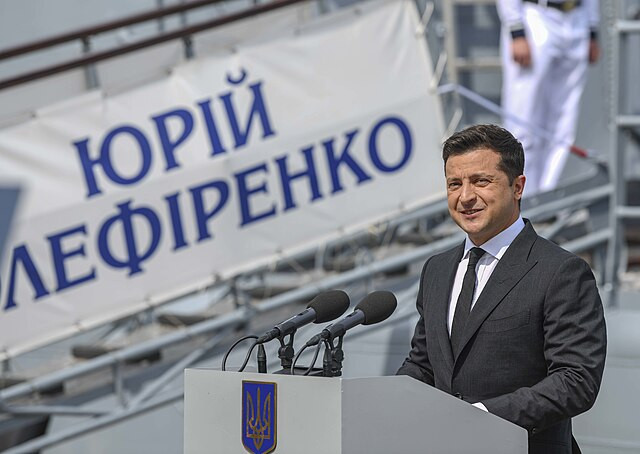Ukraine marked the third anniversary of Russia's full-scale invasion on Monday, as European leaders gathered in Kyiv to reaffirm their support while the United States conspicuously stayed away. The event underscored growing transatlantic tensions as the Trump administration signals a major shift in U.S. policy toward Russia and Ukraine. The absence of senior U.S. officials came as President Donald Trump has openly questioned Ukraine's leadership, called President Volodymyr Zelenskyy a "dictator," and engaged in discussions to reestablish diplomatic and economic ties with Moscow.
Among the visiting leaders were European Commission President Ursula von der Leyen, Canadian Prime Minister Justin Trudeau, and multiple heads of state from across Europe. Von der Leyen warned that the outcome of the war would determine global security, stating, "The autocrats around the world are watching very carefully whether there's any impunity if you violate international borders or invade your neighbor, or if there is true deterrence."
European officials have grown increasingly concerned about Trump's approach to the war, which appears to favor direct negotiations with Russian President Vladimir Putin while excluding Ukraine and its European allies from the process. EU foreign policy chief Kaja Kallas, who led a meeting of European ministers in Brussels, said, "It's clear that the statements coming from (the) United States make us all worried." European Council President Antonio Costa announced an emergency EU summit on March 6 to discuss the implications of Washington's policy changes.
As European leaders met in Kyiv, Russia launched its largest single drone attack of the war, sending 267 drones into Ukraine's territory. The offensive comes amid growing battlefield challenges for Ukraine, with Russian forces making incremental gains and Ukrainian troops struggling with shortages of ammunition and personnel. Spain responded to the attack by pledging a €1 billion ($1.04 billion) military aid package, while the European Union approved new sanctions targeting Russian oil transport networks and companies supplying military equipment. The United Kingdom imposed its most extensive sanctions package since the early days of the war, hitting 107 Russian entities, including Chinese firms allegedly supplying machine tools and electronics to Moscow.
Trump's shift toward Russia has alarmed European capitals, where leaders fear being sidelined in discussions about the war's resolution. British Prime Minister Keir Starmer and French President Emmanuel Macron are both scheduled to visit Washington this week, seeking clarity on U.S. intentions. Trump's moves have prompted speculation that Ukraine may have to negotiate directly with Russia on Moscow's terms.
Zelenskyy, speaking at the Kyiv summit, emphasized that Ukraine would not accept any peace deal that left it vulnerable to further Russian aggression. "Putin will not gift us this peace, nor will he give it to us in exchange for anything. We have to win peace with strength, wisdom, and unity-through our cooperation," he said.
Washington and Moscow have already begun discussions to reestablish formal diplomatic ties, and Russian officials have confirmed that preparations for a Trump-Putin meeting are underway. In a video call with Group of Seven (G7) leaders on Monday, Trump suggested that peace negotiations with Russia could be accompanied by "major economic development transactions" between the U.S. and Russia.
At the United Nations, divisions between the U.S. and Europe became even more apparent. A U.S.-drafted resolution marking the war's third anniversary was amended by European states to explicitly recognize Russia's invasion as a violation of the U.N. Charter. The U.S. ultimately abstained from voting on its own proposal, a rare diplomatic move that further illustrated Washington's changing stance.
Complicating Ukraine's position is an ongoing dispute over a proposed minerals agreement with the U.S. that Kyiv has hesitated to sign. The deal would grant U.S. firms access to Ukraine's vast natural resources, but Zelenskyy has objected to Washington's demand for $500 billion worth of minerals in exchange for continued aid. The Ukrainian government has reportedly sent final revisions to the agreement, though U.S. officials have resisted including security guarantees for Ukraine in the text.
Ukraine's battlefield challenges have intensified as military aid faces delays, and recruitment struggles hinder its war effort. "Russia does not hold all the cards in this war," Starmer said, emphasizing that Ukraine's voice must be central in any peace negotiations.
Despite Ukraine's growing isolation from Washington, European leaders remain committed to aiding Kyiv. "More than ever, we must put Ukraine in a position of strength," German conservative leader Friedrich Merz said. European Commission President von der Leyen reaffirmed that Ukraine could join the EU before 2030 if it continues its reform trajectory.




